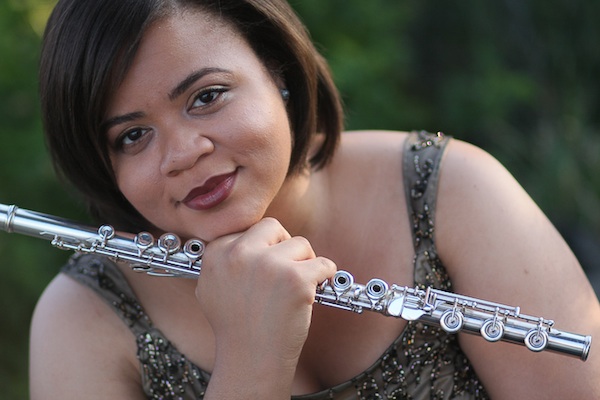
Meet Astral Artist Julietta Curenton
By Leslie Johnson, Astral Artists Astral Artists talked with flutist Julietta Curenton, an Astral artist who makes her Philadelphia recital debut on February 18, 2012 as part of Astral’s Spiritual Voyages Festival, supported by Knight Foundation. The festival is a three-concert event celebrating the musical expression of African-, Asian-, and Latin-American cultures.
A.A.: You have an interest in a wide array of musical genres. What appealed to you about being a part of the Spiritual Voyages Festival? J.C.: When [Astral’s late Artistic Director] Julian Rodescu proposed the idea of the Spiritual Voyages Festival to me, I loved it from the start! I believe Spiritual Voyages is a very important festival. America is a country full of immigrants, and our diversity is something we should always celebrate. Though I’m sure no classical musician alive would turn down a chance to perform a Romantic symphony by Brahms or a comedic opera by Mozart, I feel it is equally important for classical musicians to perform music by composers from the many different backgrounds that reflect the population of America. I’m excited that the Spiritual Voyages Festival will be highlighting the creative work of such artists, and I’m sure it will be such an inspiring day to be a part of.
A.A.: You come from a serious musical family, and also have a real connection to Philadelphia. Can you tell us about that? J.C.: I think it was determined that I would be a musician before I was born. My mother is composer Evelyn Simpson-Curenton; my aunt, Marietta Simpson, is a world-renowned mezzo-soprano; and my father was a French horn player in the U.S. Army Band, Pershing’s Own. Both my parents were brought up in musical households and became professional musicians. They were also born and raised in Philly and are Temple alumni. Whenever I come to Philadelphia I feel as if I’m coming home. I love meeting people, educators, and friends of my parents, grandparents, aunts, and uncles, and I am always filled with pride and grateful for the musical legacy they began and have left with me. Without a doubt, my family has been the most influential force in my life, and though many relatives are no longer living, I continue to take a piece of each of them wherever I go and remember them each time I perform. It is my hope to carry on their musical legacy. A.A.: What does it mean to you to perform works written by your mother? J.C.: My mother will be heavily involved in Astral projects during the next couple years, and I couldn’t be happier about that. I’ve always admired her talent and enjoy her arrangements of African-American spirituals. Concert Variations on Lift Every Voice and Sing is the piece she has arranged for my Philadelphia recital debut, part of the Spiritual Voyages Festival on February 18th. It is the first piece she has written at length for flute and piano, and I’m delighted to premiere it! I guarantee that even if you are familiar with the song Lift Every Voice and Sing, you’ve never heard it like this. You’ll hear Jazz and Bossa Nova elements in the work – sometimes at the same time. Most importantly, I felt this piece would be most appropriate for this concert, since it is often referred to as the “Black National Anthem.” The original poem Lift Every Voice and Sing was written in 1900 by James Weldon Johnson and was later adapted to music by his brother. The lyrics talk about freedom for all and gave African-Americans a hope for the future. It became so popular during the Civil Rights Movement that it was often sung right after The Star-Spangled Banner at many live events. The importance of this piece in the African-American community is immeasurable. I’m honored to perform it. A.A.: Tell us about the rest of the program for your Philadelphia recital debut on the Spiritual Voyages Festival. J.C.: The first half of my program will include works that I absolutely love: Partita in A minor, BWV 1013 by Bach; Sonatine by Henri Dutilleux; and Introduction and Variations on Trockne Blumen by Schubert. The second half will include works by African-American composers.
Recent Content
-
Artsarticle ·
-
Artsarticle ·
-
Artsarticle ·

